
|
You entered: comet Tempel-Tuttle
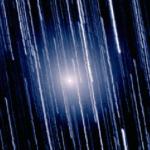 Tempel-Tuttle: The Leonid Comet
Tempel-Tuttle: The Leonid Comet
30.01.1998
Star trails streak this composite time exposure of Comet Tempel-Tuttle recorded by T. Puckett on January 26. Presently passing through the inner solar system on its 33 year orbit around the Sun, Tempel-Tuttle has brightened unexpectedly, but binoculars or small telescopes are still required to visually observe it.
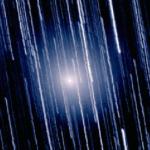 Tempel Tuttle: The Leonid Comet
Tempel Tuttle: The Leonid Comet
13.11.1999
Star trails streak this composite time exposure of Comet Tempel-Tuttle recorded by T. Puckett on January 26, 1998. Then passing through the inner solar system on its 33 year orbit around the Sun, Tempel-Tuttle brightened unexpectedly, but binoculars or small telescopes were still required to visually observe it.
 Tempel Tuttle: The Leonid Comet
Tempel Tuttle: The Leonid Comet
16.11.2002
Star trails streak this composite time exposure of comet Tempel-Tuttle recorded by Tim Puckett on January 26, 1998. Then passing through the inner solar system on its 33 year orbit around the Sun, Tempel-Tuttle brightened unexpectedly, but binoculars or small telescopes were still required to visually observe it.
 Meteors Between Stars and Clouds
Meteors Between Stars and Clouds
11.12.2002
Streaking high above diffuse clouds -- but well in front of distant stars -- are sand-sized bits of an ancient comet: meteors. These bits flaked off Comet Tempel-Tuttle during its pass through the inner Solar System about 150 years ago. Far in the background are stars toward the constellation of Ursa Major.
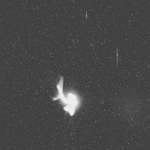 A Leonid Meteor Explodes
A Leonid Meteor Explodes
18.11.2001
Last night and tonight, a lucky few may see a meteor explode. As our Earth passes unusually close to debris expelled from Comet Tempel-Tuttle, many sand-sized particles from this comet are entering and burning up in the Earth's atmosphere.
 The Leonid Meteor Shower (Tonight)
The Leonid Meteor Shower (Tonight)
16.11.1996
Tonight thousands of icy rocks will hurl toward Earth in a fascinating display of light called the Leonid Meteor Shower. There is little danger - few will reach the ground. But this year's Leonids could be nothing compared to the Leonids in 1998.
 The Leonid Meteor Shower
The Leonid Meteor Shower
16.11.1997
The Leonid Meteor Shower will likely reach its peak in the early hours this Monday morning. Though the Moon will be bright, Leo, the shower's radiant point, will be well above the eastern horizon from Western North America and the Pacific region during this period.
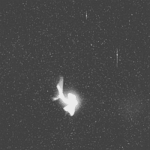 A Leonid Meteor Explodes
A Leonid Meteor Explodes
17.11.1999
Tonight, a lucky few may see a meteor explode. Over the next 36 hours the Earth will pass unusually close to debris expelled from Comet Tempel-Tuttle, causing many sand-sized particles from this comet to enter and burn up in the Earth's atmosphere.
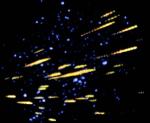 Meteors Now and Again
Meteors Now and Again
10.08.1998
The Perseid Meteor Shower, usually the best meteor shower of the year, will peak over the next two nights. Over the course of an hour, a person watching a clear sky from a dark location might see as many as 100 meteors.
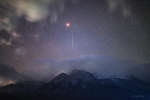 Mars and Meteor over Jade Dragon Snow Mountain
Mars and Meteor over Jade Dragon Snow Mountain
21.11.2020
A brilliant yellowish celestial beacon, Mars still dazzles in the night. Peering between clouds the wandering planet was briefly joined by the flash of a meteor in this moonless dark sky on November 18. The single exposure was taken as the Earth swept up dust from periodic comet Tempel-Tuttle during the annual Leonid Meteor Shower.
|
January February |
|||||||||||||||||||||||||||||||||||||||||||||||||